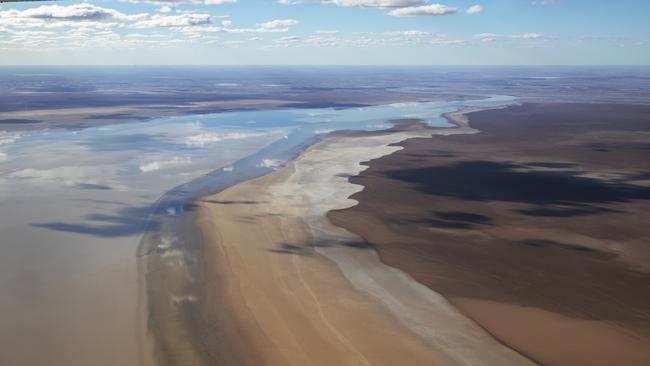Conservationists and farmers lock arms to resist future fracking in flood plains
Farmers and conservationists have joined forces to prevent future fracking and other ‘unconventional’ gas extraction from the headwaters of pristine Kati Thanda-Lake Eyre Basin.

Farmers and conservationists have joined forces to prevent future fracking and other “unconventional” gas extraction from the headwaters of pristine Kati Thanda-Lake Eyre Basin in central Australia.
It comes after delays to protections promised by the Palaszczuk government seven years ago allowed a gas company to secure leases to explore for shale oil in the region.
The ecologically and culturally significant Georgina, Diamantina and Cooper rivers and a vast swath of waterways and flood plains are shaping up as a political battleground as the government revisits the plans to strengthen protections across the basin.
Before the 2015 election, Queensland Premier Annastacia Palaszczuk vowed to revive the former Bligh government’s Wild Rivers framework to limit gas exploration in the region. She made similar pledges before the 2017 and 2020 elections.
The region has for several decades hosted a small but profitable natural gas industry using conventional extraction methods but there are concerns among landholders and conservationists that fracking methods may be used as the industry expands.
Last year, the government established a Lake Eyre Basin Stakeholder Advisory Group, featuring conservationists, traditional owners, farmers and miners, to attempt to find a consensus. Multiple sources close to the discussions at the group’s final meeting on Wednesday said no consensus had been found, and even the government’s own environment and resources departments disagreed about the direction of the plan.
A spokesman from the Department of Environment and Science said the government would now consider advice presented in the meetings and prepare a regulatory impact statement for wider consultation and provide “options for longer term sustainable management” of the basin.
Dalene Wray, managing director of beef company OBE Organic, which sources cattle from throughout the Lake Eyre Basin, said she was concerned about the free flow of water through the productive Channel Country.
“What we need policymakers to understand is it is a unique environment; there is nowhere else like it in the world, and it is reliant on free-flowing rivers,” she said.
“Much, if not all, resource activity in that part of the world does have significant consequences with regard to water flow.
“Farmers here understand the cycle of droughts and flooding rains and we know that when the rains come, we need the water to flow freely.”
AgForce chief executive Michael Guerin said protection of agricultural land should be prioritised in the discussions and farmers were “increasingly frustrated” that government consultation focused on a select few instead of wide community engagement.
“We have a small panel of people having conversations but we don’t have the relevant departments in the communities allowing the communities to engage at the front end of it,” Mr Guerin said.
“Good policy change comes from starting that work with the deep engagement of the communities and relevant departments, not coming in at the back end of draft legislation that you might get a minor change to.”
Conservationists have called for no new “conventional” gas operations, a ban on “unconventional” methods like fracking, and tighter regulatory protection of the rivers and flood-plains.
They were shocked in December when the Palaszczuk government granted a lease to Origin Energy to explore for shale oil across 225,000ha near Windorah.
“The Palaszczuk government has promised to strengthen protection of Kati Thanda Lake Eyre Basin rivers and flood-plains at every election since 2015 – that’s seven years ago,” Western Rivers Alliance Co-ordinator Riley Rocco said. “Since this commitment was made, we’ve seen new oil and gas leases granted across the Cooper Creek flood-plain and this is unacceptable.
“These are some of the world’s last great remaining free-flowing rivers and their delicate flood-plains are no place for gas fields”
Gas companies are not prepared to walk away. Australian Petroleum Production and Exploration Association Queensland director Matthew Paull said the industry would continue to operate with minimal impact.
Mithaka man George Gorringe said the discussions marked the next fight for the land’s traditional owners.
“Back in the 1990s we fought to save the Cooper from cotton irrigation; now we need to protect the rivers and flood plains from oil and gas,” he said.




To join the conversation, please log in. Don't have an account? Register
Join the conversation, you are commenting as Logout